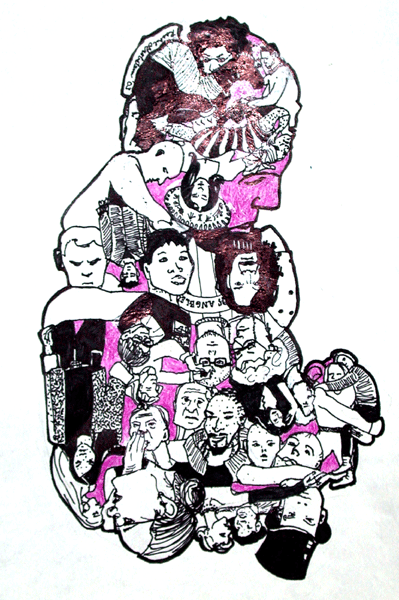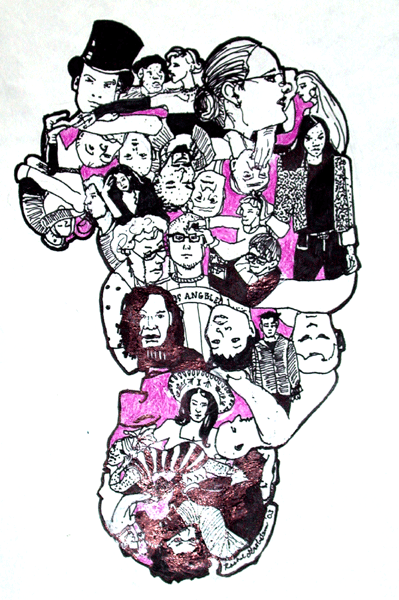Made available on Serendip
In association with Making Sense of Diversity: An Exploration, a world wide conversation

|
April 1, 2005
Diane Scarpa (06) and Sandy Schram
(Graduate School of Social Work)
Red, Blue, Purple: Political Diversity
Participants
Summary
Prepared by Anne Dalke
Additions, revisions, extensions are encouraged in the On-Line Forum
| 
|
Discussion began with participants introducing themselves by political affiliation, followed by the question of how we might adjudicate such diversity.
After she voted for Bush in the November election, a student was told, "I hope you are the first to get drafted and killed." How can such things be said without repercussions @ Bryn Mawr? Do college campuses like this one, which pride themselves on being liberal, not respect and discriminate against those who are in the political minority? Or is the use of the word "liberal" a big problem? (Bryn Mawr is historically a conservative institution; hiding behind the word "liberal" may well mask what we actually believe.) Or is the oppression of Republicans a myth, at a time when young Republicans outnumber young Democrats on college campuses? In any case, is it possible to create a space for open dialogue, if the point of political discussion is to insist both on maintaining one's own position, and converting the other to one's own point of view? Are we willing to give others a chance to speak, in order to be changed ourselves? Or do we want to make Bryn Mawr a "safe space" for those who think like ourselves? How can we say what we think to one another, without shutting down dialogue? Can we find ways to say to one another, "There is a divide here, and I disagree with you?"--rather than trying incessently to "win one another over"?
Small liberal arts colleges like this one are"precious fragile creations." There are many tensions associated with maintaining safety, civility and respect--all of which can be exploited for political effect. Civility can be used to squelch political dissent; a call for respect can be used to discourage people from saying uncomfortable things. For learning, we need to be able to speak honestly with one another. Professors don't want to lie about their advocacy work--and it would be absurd for those who are publicly visible to hide their political views. But there is also a danger in "exploiting the power of the podium," and so failing to make the classroom a "safe space to disagree."
We noted that a "big problem in our reactions" is that we "make assumptions" about how people think, and who they are, based on how they vote. People affiliate with political parties because they find "enough there to agree with," not because their positions are identical with those of the party platform; voters do not generally completely agree with the candidates for whom they cast their votes. A vote does not necessarily mean whole-hearted support. "There are votes, and there are views." Not everybody who votes the same is the same. Votes are not a very good index to how people think. But it isn't it a good index to what policies they support? There is a very simple and sharp divide beween pro-choice and pro-life. Can't we be hurt by another's vote? There is a pragmatic aspect here, and how we vote matters. The decisions we make at the ballot box are important.
But what if we applied such a simple dichotomy to all other imaginable divisions--between Palestineans and Israelis in the Middle East, for instance, or between blacks and whites in this country? Do we really think that all the members of each of those groups are in agreement? How useful is it to draw such dichotomies and boundaries at this politically divisive and volatile time? Hannah Arendt was an important theorizer about the need for a political public space. Following her thinking: can we create a safe(r) space for politics by worrying less about someone's "essence" or "identity," and engaging instead with their ideas? Can we eschew identity thinking, and not impute identity based on political action?
Several spoke to challenge the dichotomy of Republicans and Democrats, parties which are both represented in the space of dialogue. Anarchism is an "acceptable topic for derision"; the "ways an anarchist likes to organize" are not possible here. Democrats and Republicans may differ on domestic issues, but to someone from another country, their international policies look the same. The largest group on campus actually isn't Republican or Democrat, but rather a-political; most people have no faith in the power of political parties to act. It is frustrating not to have multi-party representation. Issues-based groups on campus do not acknowlege the political aspect of the work they do.
The discussion ended with an invitation from the civic Engagement ofice to continue the dialogue, and the suggestion that we try to learn to deal with our different political choices without "essentializing" one another's identities in the process.
The discussion is invited to continue further in the on-line forum on "Making Sense of Diversity," and will resume in person at noon on Friday, April 15, when Paul Grobstein of the Biology Department and Maria Scott-Wittenborn (07) will lead a discussion about "Breaking the Silence: Mental Health Issues at Bryn Mawr College."
| Return to Schedule for Friday Noon Conversations

| Bryn Mawr Conversations
| Archived
Forum
| Archive of Bryn Mawr Conversation
| General Conversation
| Serendip Home |
These pages are sponsored by the Bryn Mawr College Office
of Intercultural Affairs, the Center for Science and Society and the Serendip
website. Send us additional comments or suggestions at Serendip
© by Serendip 1994-
- Last Modified:
Wednesday, 21-June-2005 15:18:00 EST

